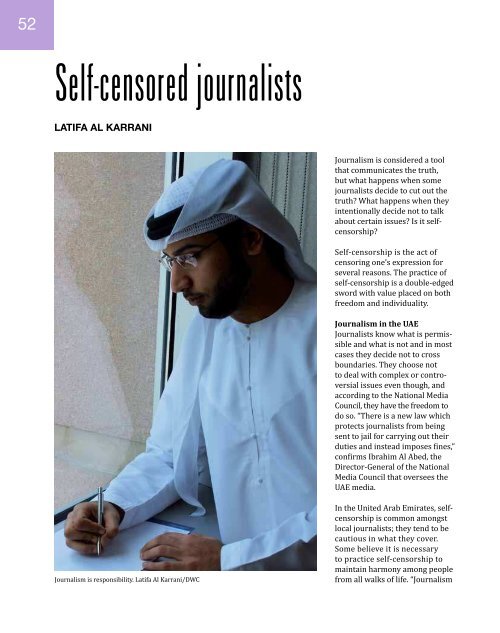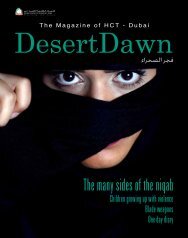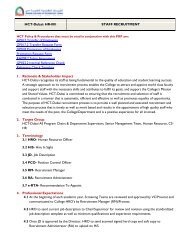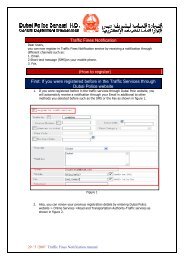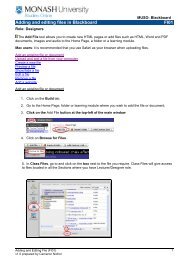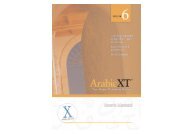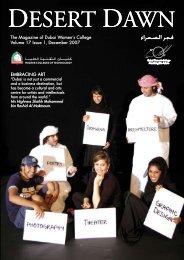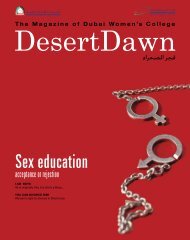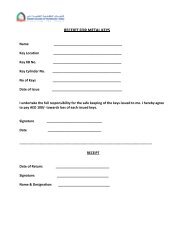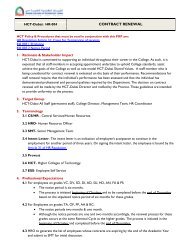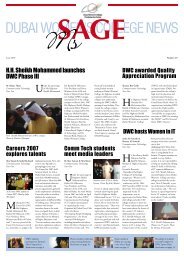The unrevealed trauma - Dubai Women's College - Higher Colleges ...
The unrevealed trauma - Dubai Women's College - Higher Colleges ...
The unrevealed trauma - Dubai Women's College - Higher Colleges ...
Create successful ePaper yourself
Turn your PDF publications into a flip-book with our unique Google optimized e-Paper software.
52 53<br />
Self-censored journalists<br />
LATIFA AL KARRANI<br />
Journalism is responsibility. Latifa Al Karrani/DWC<br />
Journalism is considered a tool<br />
that communicates the truth,<br />
but what happens when some<br />
journalists decide to cut out the<br />
truth? What happens when they<br />
intentionally decide not to talk<br />
about certain issues? Is it selfcensorship?<br />
Self-censorship is the act of<br />
censoring one’s expression for<br />
several reasons. <strong>The</strong> practice of<br />
self-censorship is a double-edged<br />
sword with value placed on both<br />
freedom and individuality.<br />
Journalism in the UAE<br />
Journalists know what is permissible<br />
and what is not and in most<br />
cases they decide not to cross<br />
boundaries. <strong>The</strong>y choose not<br />
to deal with complex or controversial<br />
issues even though, and<br />
according to the National Media<br />
Council, they have the freedom to<br />
do so. “<strong>The</strong>re is a new law which<br />
protects journalists from being<br />
sent to jail for carrying out their<br />
duties and instead imposes fines,”<br />
confirms Ibrahim Al Abed, the<br />
Director-General of the National<br />
Media Council that oversees the<br />
UAE media.<br />
In the United Arab Emirates, selfcensorship<br />
is common amongst<br />
local journalists; they tend to be<br />
cautious in what they cover.<br />
Some believe it is necessary<br />
to practice self-censorship to<br />
maintain harmony among people<br />
from all walks of life. “Journalism<br />
is more art than science; it has<br />
red lines and essential points that<br />
must be adhered to. Journalists<br />
should practice self-censorship<br />
because reporting is a huge<br />
responsibility. Some journalists<br />
exaggerate some issues, which<br />
aggravate community problems<br />
and cause public confusion. Our<br />
community is conservative, it’s a<br />
fact,” explains Geehan Al Shoieri,<br />
Editor at Al Khaleej Newspaper.<br />
Reasons<br />
Different journalists identified<br />
similar reasons for why they selfcensor<br />
their work. <strong>The</strong> conservative<br />
local society is an important factor,<br />
they say. <strong>The</strong>y do not want to be<br />
criticized for discussing sensitive<br />
issues; therefore, they create a<br />
zone through which they filter<br />
the content before offering it to<br />
the public. Playing it safe is their<br />
preference. Rafeeq Al Jerjawi,<br />
Deputy Managing Editor of<br />
Emirates Today, talks about why<br />
journalists practice self-censorship.<br />
“<strong>The</strong> majority of stories are often<br />
or sometimes avoided because of<br />
the complexity of society, plus the<br />
fear of pressure. Embarrassment<br />
of being criticized by society is<br />
basically what stops journalists<br />
from writing about some issues.”<br />
Another reason is that societies<br />
are usually divided into opponents<br />
and proponents of certain issues<br />
and journalists take this into<br />
account to avoid creating conflict.<br />
A local journalist in one of the<br />
Arabic newspapers who asked not<br />
to be identified confesses: “Yes, I<br />
do practice self-censorship. <strong>The</strong>re<br />
are issues I can discuss with my<br />
readers, but I decide not to write<br />
about topics or issues I can’t solve.<br />
I don’t write to create a buzz.”<br />
THEY<br />
(JOURNALISTS)<br />
DO NOT WANT<br />
TO BE CRITICIZED<br />
FOR DISCUSSING<br />
SENSITIVE ISSUES...<br />
Public’s rights<br />
Certain issues are kept hidden<br />
from the public, but members<br />
of society demand the right to<br />
receive the news. “If journalism<br />
was meant to deliver the news,<br />
why not do it fully. It is a matter<br />
of personal prejudice. I will decide<br />
what I want to know. Let them<br />
write about everything, we have<br />
the right to be aware,” says Aisha<br />
Abdulla, a teacher.<br />
In response, Haitham Ahli, global<br />
management graduate, offers a<br />
different perspective. “In my point<br />
of view, censorship is part of society;<br />
there are occasions when it is<br />
necessary for journalists to self-<br />
censor. It has many benefits, and<br />
it must be exercised to avoid<br />
conflict in society itself.”<br />
How much self-censorship<br />
is being practiced?<br />
<strong>The</strong> amount of self-censorship<br />
practiced in the UAE can be<br />
measured through the sensation<br />
and buzz in society, which is almost<br />
fictional in the UAE. Nassir Al.R,<br />
a retired journalist who worked<br />
for eight years in Al Bayan Newspaper<br />
believes “self-censorship<br />
lives inside all writers. It is the<br />
voice of fear that stops us. It is<br />
the voice that tells us you can’t<br />
write about certain subjects<br />
because it’s controversial.”


